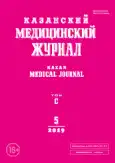Relationship Between Delta Troponin I Levels And In-Hospital Cardiovascular Endpoints In Acute ST Elevation Myocardial Infarction
- Authors: Ercan A.1, Altug O.2, Selcuk Y.3, Salih S.4, Kocayiğit İ.4, Keser N.4, Huseyin G.4
-
Affiliations:
- Department of Cardiology, Vakfikebir State Hospital
- Department of Cardiology, Dr. Siyami Ersek Cardiovascular and Thoracic Surgery Center
- Department of Internal Medicine, Sakarya University Education and Research Hospital
- Department of Cardiology, Sakarya University Educationand Research Hospital
- Issue: Vol 100, No 5 (2019)
- Pages: 740-745
- Section: Theoretical and clinical medicine
- URL: https://bakhtiniada.ru/kazanmedj/article/view/16310
- DOI: https://doi.org/10.17816/KMJ2019-740
- ID: 16310
Cite item
Full Text
Abstract
Objectives. In this study, we investigated the relationship between the rate of increase in troponin I levels and in-hospital cardiovascular endpoints (outcomes) in patients with ST-elevation myocardial infarction (STEMI).
Methods. Eighty-four patients with acute STEMI who received thrombolytic treatment or who underwent primary percutaneous coronary intervention (PCI) were enrolled. After admission to hospital, delta troponin I levels, which were determinedby serial measurements after 2, 4, and 6 h of admission, and in-hospital major cardiovascular events were evaluated.
Results. There were 35 (41.7%) patients in the thrombolytic group and 49 (58.3%) patients in the primary PCI group. As major cardiovascular endpoints, death from cardiovascular events was seen in 7 (8.3%) patients, stroke/transient ischemic attack in 2 (2.4%), recurrent ischemia in 5 (6%), arrhythmia in 8 (9.5%), and urgent revascularization was performed in 5 (6%) cases. In patients with arrhythmia, ventricular fibrillation was seen in 3 (3.6%) patients, atrial fibrillation in 3 (3.6%), and ventricular tachycardia in 2 (2.4%) patients. The ventricular septal defect was observed only in 1 (1.2%) patient as a mechanical complication, and the patient underwent urgent surgery. The analysis of all patients and sub-groups of thrombolytic and primary PCI patients revealed no statistically significant difference between delta troponin I levels at time intervals of (0–2), (0–4), and (0–6) h and in-hospital major cardiovascular endpoints (p >0.05).
Conclusion. The analysis of delta troponin I levels is not a predicting factor of in-hospital endpoints (outcomes) in patients with STEMI treated by thrombolytic therapy or primary PCI. Randomized controlled studies with a larger study population are needed on this subject.
Full Text
##article.viewOnOriginalSite##About the authors
Aydin Ercan
Department of Cardiology, Vakfikebir State Hospital
Author for correspondence.
Email: ercanaydin112@yahoo.com
Turkey, Trabzon, Turkey
Osken Altug
Department of Cardiology, Dr. Siyami Ersek Cardiovascular and Thoracic Surgery Center
Email: ercanaydin112@yahoo.com
Turkey, Istanbul, Turkey
Yaylaci Selcuk
Department of Internal Medicine, Sakarya University Education and Research Hospital
Email: ercanaydin112@yahoo.com
Turkey, Sakarya, Turkey
Sahinkus Salih
Department of Cardiology, Sakarya University Education and Research Hospital
Email: ercanaydin112@yahoo.com
Turkey, Sakarya, Turkey
İbrahim Kocayiğit
Department of Cardiology, Sakarya University Education and Research Hospital
Email: ercanaydin112@yahoo.com
Turkey, Sakarya, Turkey
Nurgul Keser
Department of Cardiology, Sakarya University Education and Research Hospital
Email: ercanaydin112@yahoo.com
Sakarya, Turkey
Gunduz Huseyin
Department of Cardiology, Sakarya University Education and Research Hospital
Email: ercanaydin112@yahoo.com
Sakarya, Turkey
References
- Callow A.D. Cardiovascular disease 2005-theglobal Picture. Vascul. Pharmacol. 2006; 45: 3027. doi: 10.1016/j.vph.2006.08.010.
- Murphy J.G., Lloyd M.A. Mayo Clinic Cardiology Textbook. Thirded. Mayo Clinic Scientific Pres. 2007; 843 р.
- Wu A.H.B., Apple F.S., Gibler W.B. et al. National Academy of Clinical Biochemistry Standards of Laboratory Practice: recommendations for the use of cardiac markers in coronary artery diseases. Clin. Chem. 1999; 45: 1104–1121. PMID: 10388496.
- Bassand J.P., Hamm C.W., Ardissino D. et al. Guidelines for the diagnosis and treatment of non-ST-segment elevation acute coronary syndromes. Task Force for Diagnosis and Treatment of Non-ST-Segment Elevation Acute Coronary Syndromes of European Society of Cardiology. Eur. Heart J. 2007; 28: 1598–1660. doi: 10.1093/eurheartj/ehm499.
- Reichlin T., Irfan A., Twerenbold R. et al. Utility of absolute and relative changes in cardiac troponin concentrations in the early diagnosis of acute myocardial infarction. Circulation. 2011; 124: 136–145. doi: 10.1161/CIRCULATIONAHA.111.023937.
- Xiao W., Cao R., Liu Y. et al. Association of high-sensitivity cardiac troponin T with mortality and cardiovascular events in a community-based prospective study in Beijing. BMJ Open. 2017; 7 (6): e013431. doi: 10.1136/bmjopen-2016-013431.
- Fesmire F.M. Delta CK-MB outperforms delta troponin I at 2 hours during the ED rule out of acute myocardial infarction. Am. J. Emerg. Med. 2000; 18: 1–8. doi: 10.1016/S0735-6757(00)90038-X.
- Fesmire F.M., Hughes A.D., Fody E.P. et al. The Erlanger chest pain evaluation protocol: a one-year experience with serial 12-lead ECG monitoring, two-hour delta serum marker measurements, and selective nuclear stress testing to identify and exclude acute coronary syndromes. Ann. Emerg. Med. 2002; 40: 584–594. doi: 10.1067/mem.2002.129506.
- Marin M.M., Teichman S.L. Use of rapid serial sampling of creatine kinase MB for very early detection of myocardial infarction of patients with acute chest pain. Am. Heart J. 1992; 123: 354–361. doi: 10.1016/0002-8703(92)90646-D.
- Young G.P., Gibler W.B., Hedges J.R. et al. Serial creatine kinase-MB results are a sensitive indicator of acute myocardial infarction in chest pain patients with nondiagnostic electrocardiograms: the second Emergency Medicine Cardiac Research Group Study. Acad. Emerg. Med. 1997; 4: 869–877. doi: 10.1111/j.1553-2712.1997.tb03812.x.
- Apple F.S., Christenson R.H., Valdes R.J. et al. Simultaneous rapid measurement of whole blood myoglobin, creatine kinase MB, and cardiac troponin I by the triage cardiac panel for detection of myocardial infarction. Clin. Chem. 1999; 45: 199–205. PMID: 9931041.
- Fesmire F.M., Percy R.F., Bardoner J.B. et al. Serial creatinine kinase (CK) MB testing during the emergency department evaluation of chest pain: utility of a 2-hour deltaCK-MB of +1.6 ng/ml. Am. Heart J. 1998; 136: 237–244. doi: 10.1053/hj.1998.v136.89571.
- Mueller M., Biener M., Vafaie M. et al. Absolute and relative kinetic changes of high-sensitivity cardiac troponin T in acute coronary syndrome and in patients with increased troponin in the absence of acute coronary syndrome. Clin. Chem. 2012; 58: 209–218. doi: 10.1373/clinchem.2011.171827.
- Sanchis J., Abellan L., Garcia-Blas S. et al. Usefulness of delta troponin for diagnosis and prognosis assessment of non-ST-segment elevation acute chest pain. Eur. Heart J. Acute Cardiovasc. Care. 2016; 5: 399–406. doi: 10.1177/2048872615593534.
Supplementary files






